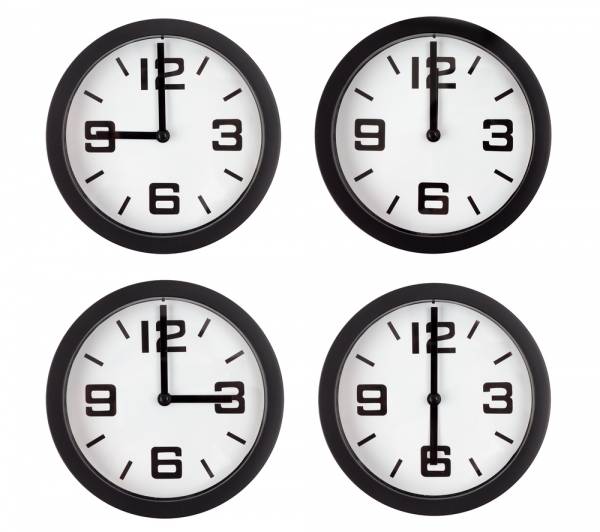By Anthoney J. Andersen – Steroidal.com
Morning? Afternoon? Evening?
Many people have different preferences for what part of the day is the best time to workout. And honestly, it’s based on just that – a person’s preference.
Some people swear by early morning exercise – getting a jog or workout in around 6 a.m. before having to go to work, or getting the kids out of bed and ready for school.
However, other people wouldn’t dream of breaking a sweat before noon, while others would rather take an evening walk after dinner.
The truth is, there is no scientific evidence to support what time of day burns the most calories, but the time of day can influence how you feel when exercising.
Whatever your preference may be – the goal is to find a time of day that you can stick with, so that exercising becomes a habit.
YOUR INTERNAL CLOCK
According to WebMD, your body’s circadian rhythm determines whether you’re a night owl, or an early bird, and there’s not much you can do to alter it.
CIRCADIAN RHYTHM
Most people experience different levels of sleepiness and alertness throughout the day – but what cause these patterns?
According to the National Sleep Foundation, sleep is regulated by two body systems: sleep/wake homeostasis, and the circadian biological clock. When a person has been awake for a long period of time, the sleep/wake homeostasis begins to tell the body that it’s time to take action, and get some rest.
It also helps us accumulate enough sleep throughout the night to make up for the hours that we are awake. If this restorative process existed alone, it would mean that we would be most alert as our day was starting out, and that the longer we were awake, the more we would feel like sleeping. The sleep/wake homeostasis creates a drive in our bodies that balances sleep and wakefulness.
On the other hand, our internal circadian biological clocks help regulate the timing of periods of sleepiness and wakefulness throughout the day.
 According to WebMD, the circadian rhythm is governed by a 24-hour pattern of the earth’s rotation. These rhythms influence the body’s functions – such as blood pressure, body temperature, hormone levels and heart rate – all of which play a role in your body’s readiness for exercise.
According to WebMD, the circadian rhythm is governed by a 24-hour pattern of the earth’s rotation. These rhythms influence the body’s functions – such as blood pressure, body temperature, hormone levels and heart rate – all of which play a role in your body’s readiness for exercise.
The circadian rhythm dips and rises at different points in the day, so an adult’s strongest sleep drive is generally between 2:00-4:00 a.m., and in the afternoon between 1:00-3:00 p.m.
The sleepiness you experience during the circadian dips will be less intense if you accumulate enough sleep throughout the night.
EVERY PERSON IS DIFFERENT
This couldn’t be truer.
Each person has a different work schedule, or other responsibilities (like raising kids) that factor into when they can work out.
“The best time of day is when you’ll do it most consistently, because the benefits of physical activity are tightly linked to the amount you do on a consistent basis,” said Russell Pate, M.D., professor of exercise science in the Arnold School of Public Health at the University of South Carolina in Columbia.
Pate goes on to say that your best time to workout is based on a handful of factors, such as:
- Location
- Time of day
- Type of physical activity
- Social setting
“It’s not just what time, but also what activity, with whom and where,” said Pate, who is also an American Heart Association volunteer. “This mix of factors for people comes together to result in being consistent.”
THE BENEFITS OF MORNING EXERCISE
The idea of waking up earlier than you have to can be quite daunting to some people. Why trade in an hour of sleep, for an hour workout? Well, if you can muster up the strength to roll out of bed earlier than normal, then you might find the benefits of an early morning exercise quite rewarding.
As mentioned earlier, there is currently no scientific evidence to support which time of day burns the most calories, however, there is evidence to support that an early morning workout can help benefit your body in other ways.
According to an article in The Huffington Post – “6 Benefits To Being A Morning Exerciser” – exercising in the morning can help create a positive routine both physically and mentally.
IMPROVED PRODUCTIVITY
When you exercise, your body produces a surge of endorphins (neurotransmitters responsible for transmitting electrical signals within the nervous system), which will supply your body with the energy boost that it needs, so you can tackle your day more effectively. Working out can increase your mental clarity for four to 10 hours post-exercise.
BOOSTED METABOLISM
The secret to boosting your metabolism and creating permanent weight loss, is by training your body to be a more efficient calorie-burning engine. To do this, you must maximize your body’s metabolism.
Metabolism is the rate at which a person burns energy, which is measured in calories. The benefits of exercise continue to linger throughout the day, as your body continues to burn calories, long after your workout is done.
Be sure to use this benefit during the day when you are eating , rather than when you are sleeping. By keeping your metabolism elevated, you will be burning more calories all day long.
LEAVES TIME FOR OTHER PRIORITIES
Often times people tell themselves that they will squeeze in a quick workout after work. However, more times than not, life get’s in the way, and you find yourself putting off exercising until the following day. Or the day after that. Or quite possibly the following week.
There’s no arguing the fact that other priorities come up that you must tend to first. With that being said, wouldn’t it be more beneficial if you got the workout out of the way first thing in the morning? By getting your exercise out of the way early, it frees you up to do other social activities after work – like going to happy hour with friends and/or coworkers – or spending more time with the family.
Either way, it’s a decision that everyone can benefit from.
Especially you.







